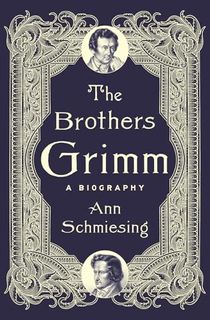The very mention of their names conjures a bit of mystery and magic: the Brothers Grimm are known for preserving the German fairy tales that have become part of our collective imagination, such as Cinderella, Hansel and Gretel, and Rapunzel. Beyond that, the average reader may not know much about the folklorists themselves. Fortunately, the academics left behind many details and clues to their lives in addition to their published works.
Early lives (and strife)
Jacob and Wilhelm Grimm were born just one year apart, in 1785 and 1786 respectively, to a jurist and the daughter of a city councilman. The family had nine children, three of whom died in infancy. The Grimms spent their early years in Hanau, then part of the Holy Roman Empire (now Germany).
Jacob has been described as the more introverted of the two, and was “small and slender with sharply cut features, while Wilhelm was taller, had a softer face, and was sociable and fond of all the arts.” Wilhelm also suffered from ill health on and off throughout his life.
When they were 10 and 11 years old, their father died; as the eldest sons of the household, they were expected to take on adult responsibilities. These were difficult years for the family, as their provider’s death thrust them into poverty and caused financial instability for years to come. However, from these trying times the brothers also developed a strong work ethic, devotion to their education, and a close bond that would last their entire lives.
The brothers attended the small University of Marburg to study law, where they also developed an interest in history, literature, and philology. Wilhelm wrote that "the ardor with which we studied Old German helped us overcome the spiritual depression of those days."
Early careers
When their mother died in 1808, Jacob assumed full responsibility for all of his younger siblings. After finishing his studies, he worked as secretary to the war office in Kassel and even traveled to Paris twice to recover art stolen during Napoleon's invasion. He then found employment as a librarian. After some time away for heart and respiratory treatments, Wilhelm joined his brother as a librarian in Kassel. Wilhelm got married in 1825; Jacob would never marry, and they continued to live together.
These early years were productive for their literary endeavors as well. In 1812, they published arguably their most memorable book, a collection of 86 folk tales known in English as Grimm's Fairy Tales. They updated it several times with more stories in later editions. Other collections followed, some of which were collaborations, while others were written individually; they largely focused on European folklore, history, and literature.
The Göttingen period

1847 daguerreotype of the brothers.
Photo Credit: WikipediaIn 1830, after both brothers were overlooked for the position of chief librarian, they moved their family to the Kingdom of Hanover and began working at the University of Göttingen—Jacob as a professor and head librarian and Wilhelm as a professor, both teaching German studies.
However, they were both dismissed from their positions in 1837. Ernest Augustus, the King of Hanover, had dissolved the parliament of Hanover and demanded oaths of allegiance from civil servants. For refusing to sign the oath, the brothers Grimm and five other professors (collectively known as the Göttingen Seven) were fired. Jacob was actually deported from Hanover.
Finding themselves in dire financial straits again, the Grimms began a lifelong project together: the Deutsches Wörterbuch, a German dictionary and their most ambitious endeavor yet. It remained unfinished at the time of their deaths and was finished later by other scholars. Now, it’s the largest and most comprehensive German language dictionary to exist.
Later years
Thanks to intervention from the King of Prussia himself, the brothers Grimm began teaching at the University of Berlin and were offered stipends to continue their research. They were elected to the civil parliament after the revolutions of 1848, one of the aims of which was to unify Germany from separate principalities into one nation. Both brothers had long believed in this cause, but became disillusioned during their time working in government.
After they retired from government and teaching, the Brothers Grimm continued their work on the Deutsches Wörterbuch. Wilhelm died in 1859 of an infection. A grieving and increasingly reclusive Jacob labored on the dictionary alone until he also died in 1863, at 78 years old.
An enduring legacy
In addition to their work in folklore, the brothers made significant contributions to linguistics. Jacob worked on what is now known as Grimm’s law, a set of sound laws about Proto-Indo-European stop consonants. He also advocated for using roman type rather than black-letter type, and spelling German nouns without capital letters, helping to modernize the language.
The brothers’ research into folklore was unique at the time because they placed value on the stories passed down by the common people, rather than literature written by the educated class. Their work and research led to the modern study of folklore as an academic pursuit.
Grimm's Fairy Tales popularized Germanic fairy tales and brought them to a wider audience. The collection has been listed by UNESCO in its Memory of the World Registry due to its cultural significance. While their scholarly pursuits cannot be overlooked, the Grimms’ greatest contribution may be the simple act of entertaining children the world over for hundreds of years.

The Brothers Grimm: A Biography
The first English-language biography in over fifty years to tell the full, vibrant story of Jacob and Wilhelm Grimm, known to history as the Brothers Grimm
“Magisterial.” —Kirkus Reviews
In addition to collecting tales, the Grimms were mythographers, linguists, librarians, civil servants, and above all the closest of brothers, but until now, the full story of their lifelong endeavor to preserve and articulate a German cultural identity has not been well known.
Drawing on deep archival research and decades of scholarship, Ann Schmiesing tells the affecting story of how the Grimms’ ambitious projects gave the brothers a sense of self-preservation through the atrocities of the Napoleonic Wars and a series of personal losses. Setting their story against a rich historical backdrop, Schmiesing offers a fresh consideration of the profound and yet complicated legacy of the Brothers Grimm.
Sources: Encyclopedia Britannica, Colorado Arts and Sciences Magazine
This post is sponsored by Yale University Press. Thank you for supporting our partners, who make it possible for The Archive to continue publishing the history stories you love.


